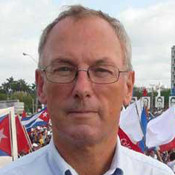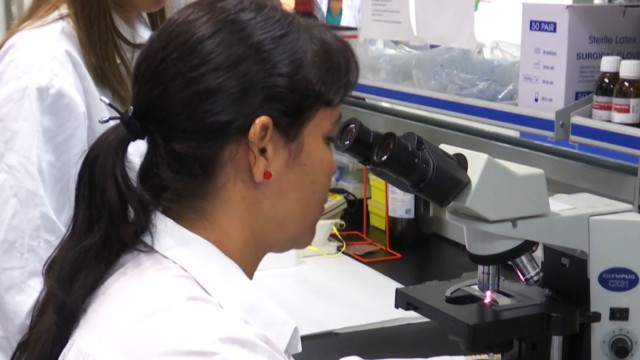Cuba has developed the world’s first lung cancer vaccine. Initial results are positive and it is also being used in several other Latin American countries. The vaccine has become the first Cuban-patented drug to be allowed to undergo clinical trials at a cancer research institute in the United States.
CGTN’s Michael Voss reports from Havana.
Caridad Gomez started smoking when she was 13. Four years ago, she was diagnosed with lung cancer. After undergoing intensive chemotherapy, she is now being treated with the world’s first lung cancer vaccine.
CimaVax-EGF is a Cuban developed drug aimed at preventing the recurrence of the disease. 56 –year-old Gomez is now back at work and once a month she returns to the hospital for a series of intramuscular injections.
“I feel good, I have even gained some weight. I’ve been using the vaccine for two years and four months now and so far I’ve felt really good,” Caridad Gomez told me.
Patients still have to complete a course of chemo or radio therapy before moving onto the vaccine.
Dr. Yoanna Flores was involved in the clinical trials the vaccine underwent at the National Oncology and Radiography Institute in Havana. There are other lung cancer fighting drugs which work by attacking the cancer cells.
What’s different about the vaccine is that it helps the body generate its own immune system in a way that starves the cancer and stops it growing.
“It has revolutionized lung cancer treatment in our country,” Dr. Flores said. “It’s a new therapeutic weapon for treating and maintaining the disease. Patients are responding well and surviving for longer than those not being treated with it,” she added.
Early results were so positive that in 2016, the Roswell Park Cancer Institute in the United States persuaded the U.S. government to allow it to test the vaccine, the first time a Cuban produced drug is undergoing clinical trials in the U.S.
The vaccine is just one of an impressive array of cancer drugs developed at Cuba’s Center for Molecular Immunology.
This research center has been working on cancer treatments for more than 20 years. It already has drugs to help with pancreatic cancer and brain tumors. Lung cancer is its first vaccine. Now it’s working on one for prostate cancer.
It was Cuba’s former leader Fidel Castro who decided to concentrate on developing a world class biotechnology sector and it’s been well-funded ever since.
Danay Saavedra is a senior scientist involved in the lung cancer vaccine and other projects at the Center for Molecular Immunology.
“It’s been a policy of the Government to develop our own means to help improve the health of our population and at the same time help improve the economy. This research center is on example of that,” she said.
If the clinical trials now underway in the United States are successful it could open the door to other Cuban pharmaceutical breakthroughs becoming available to U.S. patients.
This in turn could prove an important new income source for the Cuban economy.
 CGTN America
CGTN America

